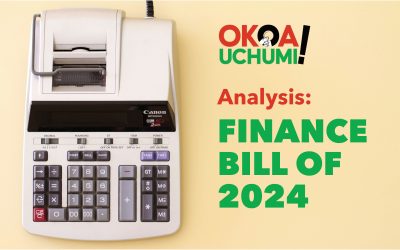Our attention is drawn to the announcement dated 4th December 2020 from Kenya’s Ministry of Finance and National Treasury on the resumption of pre COVID-19 P.A.Y.E and V.A.T tax rate levels, effective 1st January 2021. The downward revision of P.A.Y.E and V.A.T were first proposed by President Uhuru Kenyatta on 18th March 2020. The President further directed the National Treasury to retain the tax relief measures in his 12th presidential address on the COVID-19 pandemic on 28th September, 2020, as a provisional relief measure to cushion citizens in times of COVID-19 crisis.
Kenyans continue to deal with uncertain times as the rate of COVID-19 infections increases. Currently, the number of COVID-19 infection cases is at 86,383 with a 7-day moving average infection rate of 897 new cases daily. This implies that the pandemic is yet to be fully contained in the country. Further, many of the economic effects of the pandemic are yet to be ameliorated.
No legislative proposals have been tabled in Parliament to reverse COVID-19 tax cuts. Following the announcement by the National Treasury, we hold the view that reverting to the pre-COVID-19 tax rate levels is a premature and hasty measure. While noting that the tax reliefs were temporary measures, we reiterate that any attempt to go back to the tax rates before the onset of COVID-19 must strictly align with the dictates of the law, including parliamentary debate and public participation on the matter.
Parliament remains the overall institution through which tax-related proposals are approved before their implementation by the Executive wing of the Government. This was seen in the way the tax relief measures had to undergo a legislative process after the President announced them on 18th March 2020. Following the Presidential proposal, the Tax Laws (Amendment) Act 2020 – that was assented on 25th April 2020 – effected the lowering of: corporate tax rate and top income band in the P.A.Y.E. segment from 30.0% to 25.0%; V.A.T. (Amendment of the rate of Tax) Order, 2020 from 16.0% to 14.0%. This was done when the Cabinet Secretary National Treasury publishing Legal Notice No. 35 of 2020. It was, nonetheless, only effected after the Committee of Delegated Legislation and subsequently the whole National Assembly approved the Legal Notice after significant reflection on its inputs by the people’s representatives.
Unfortunately, the announcement on the resumption of pre COVID-19 P.A.Y.E and V.A.T tax rate levels is not indicative of there being any legislative proposals in either of the Houses of the bicameral parliament to effect the tax rates back to pre-COVID-19 levels.
We note that both Houses of Parliament, the Senate and National Assembly, proceeded on a two-month recess starting 4th December 2020. Therefore, it is not clear what legislative framework will be used to go back to the previous rates of taxation. With no related Bill or Amendment tabled before Parliament prior to its long recess to effect the reversal of tax relief measures, and the continued revenue shortfalls worsened by the fragile COVID-19 operating environment, we caution the National Treasury on the negative economic ramifications that may result as a consequence of this tax measure.
The current tax burden on Kenyans is an emotive matter, that is best approached by constitutional compliance to the set regulations or policy and political processes that will support open, collaborative, and inclusive decision making. There is a clear constitutional and legal demand which enshrines stringent public participation. There must be room for individuals and corporate entities to participate in the reversal of tax relief measures decision making process.
Sensitivity on this issue arises out of the belief that the resumption of the previous tax rates was contingent on full recovery of Kenya’s economy and household’s income. However, the fact is, the Government continues to maintain some COVID-19 containment measures such as the curfew, that directly hampers commercial activities. This not only points to a poor outlook for businesses but is a clear indicator that Kenyan taxpayers have yet to recover from the pandemic.
According to the World Bank Economic Update 20201, poverty rose by 4% moving an additional 2 million people into poverty, whereas unemployment has doubled to 10.4% as outlined by the Kenya National Bureau of Statistics Quarterly Labor Force Survey. Working hours have dropped from 50 to 38 hours per week, while one in every 3 household businesses have shut down and revenue from household businesses has dropped by 50%.
Furthermore, the justification that Kenya needs to raise V.A.T. and P.A.Y.E. tax rates relative to other countries, does not address the high corruption levels, wasteful public expenditure and mounting public debt burden that continue to ravage the country’s tax revenue pool.
Also, the resumption of these measures together with plans for the introduction of an extra 1% tax to set up an unemployment insurance fund (UIF) is not in touch with the reality that working Kenyans generally support a whole set of dependents. There are immediate relatives, then distant kin, friends, colleagues, among others. This is one of those ‘hidden’ expenses that make the life of an ordinary working Kenyan economically burdensome.
Any additional tax burden must therefore demonstrate actionable steps to address corruption, wasteful public expenditure, soaring public debt burden and a review of tax waivers that multinational companies continue to enjoy. It is in this regard that the undersigned civil society organization demand:
- The equal treatment of all individuals, national, corporate, and foreign corporate taxpayers. The government must review tax breaks, exemptions and incentives given to national and foreign persons which may be used for tax avoidance. Further, instead of taxing Kenyans more, the government should expand sources of revenue, e.g., by introducing inheritance tax and high levels of property tax.Nevertheless, we note in the referenced press statement, that National Treasury will retain the 100% Tax Relief for persons earning gross monthly income of up to KES. 24,000. This decision to maintain the 100% tax relief for low-income earners must be lauded as it is reflective of the government’s will to cushion the marginalized and most vulnerable segments of society to the negative impacts of COVID-19. It is also in line with new taxation policy in Kenya that limit exemptions or reliefs to essential goods and services in order to maximize revenue while at the same time minimizing tax leakages.
- The government should take advantage of available debt relief options and advocate for debt service relief especially from its commercial, bilateral, and multilateral creditors. This will free up tax revenues that would otherwise be absorbed by debt service as well as cushion the economy from COVID-19 shocks.
- The government should stop implementing expensive projects that are accruing public debt, yet no immediate benefits are trickling to common citizens at the grassroot level. For example, the impacts of the inland terminus and SGR on residents and businesses of Mombasa has caused loss of livelihoods.
- The government should move with speed to privatize resource consuming parastatals and state corporations to reduce duplication and wastage of public finances.
- National Assembly should refrain from approving huge budget deficits driven by its perverse incentives around CDF and perform its duty of oversight over the National Executive’s high borrowing independently. Parliament should not allow itself to be used as a rubber stamp by the National Executive and should exercise its legislative mandate independently.
- The principle of public participation is a key underlying pillar of the Constitution of Kenya. Therefore, citizens must be involved in the exercise of the powers of the State and in making decisions affecting them. The National Treasury must uphold the constitutional principle of public participation whenever it makes or implements public policy decisions. Failure to undertake public participation is at the peril of all Kenyans.
For further information, please contact:
Miss Isina on 0701946557, Email: admin@nta.or.ke.
ABOUT OKOA UCHUMI
The Okoa Uchumi Debt Campaign is a civil society platform committed towards working with stakeholders to redress Kenya’s public debt crisis. The coalition seeks to push for political accountability and bolster constitutional safeguards in public debt management to debt sustainability through a balanced and equitable budget.
This statement is supported by: Institute of Public Finance Kenya; Inter- Religious Council of Kenya; East Africa Tax Governance Network; Institute of Economic Affairs The Institute for Social Accountability; The National Taxpayers Association; Transparency International Kenya; Crawn Trust Kenya; Diakonia Sweden; International Budget Partnership Kenya; Kenya Human Rights Commission; Okoa Mombasa; Katiba Institute; Oxfam Kenya;


